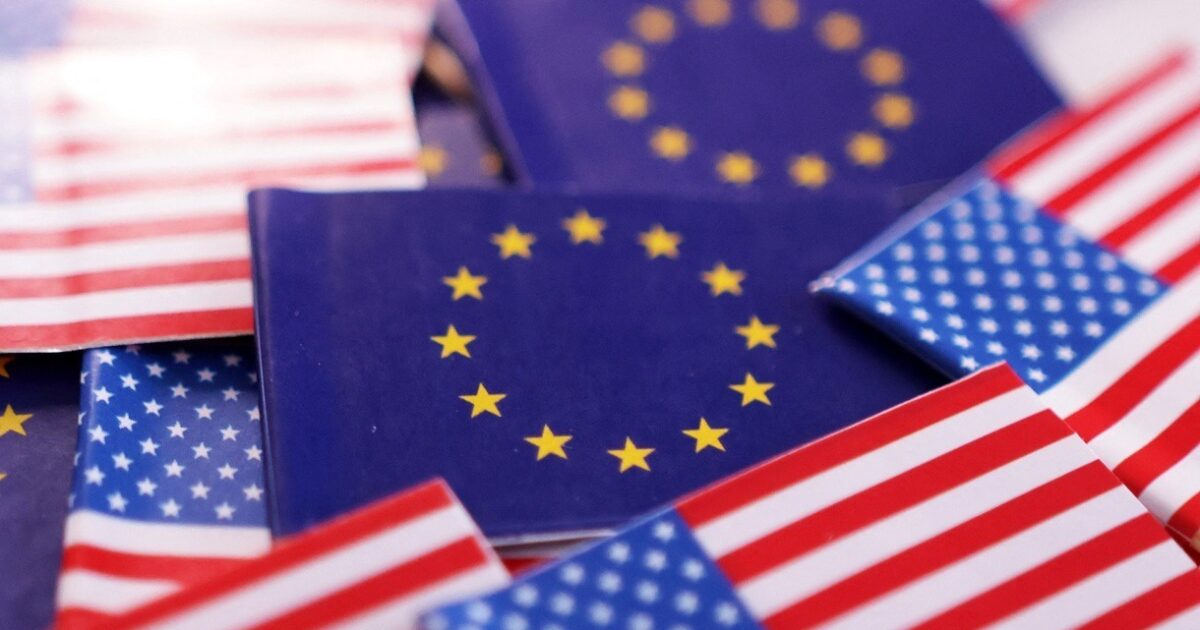Her leaders European Union are going to discuss their strategy in response to the president’s trade war Donald Trumpwith the potential options ending up accepting an unbalanced agreement or the risk of scaling with a counterattack.
European Commission President Ursula von der Laien will inform EU leaders of the US -based negotiations during a dinner today (26.6.2025), as many capitals are pushing the Commission, which handles commercial issues for the block, Power, according to people who know the issue.
The EU must reach an agreement with Trump until July 9, when duties in almost all exports of the block to the US will increase to 50%. The US president says the EU is exploiting the US with its surplus of goods and the obstacles considered to US trade.
“We hope that discussions with the US will continue with an active disposition in the coming days – July’s deadline is soon approaching,” LUC Frieden’s Luxembourg prime minister told reporters when entering the Summit. “I wish the Commission good luck.”
The negotiations have been intensified in recent weeks and detailed discussions are being held on both duties and non -tariffs, as well as key areas, strategic markets and regulatory issues that the EU hopes to face through the simplification agenda, the people said.
The US is asking the EU to do what bloc officials consider to be unbalanced and unilateral concessions, Bloomberg said earlier. Discussions about critical areas – such as steel and aluminum, cars, medicines, semiconductors and civilian aircraft – were particularly difficult.
Officials believe that the best scenario remains an agreement on the authorities to allow the negotiations to continue beyond the July early deadline.
Along with the 10% universal contribution to most goods – which is currently facing appeal to the US court – Trump has imported 25% duties to cars and twice as many duties on steel and aluminum based on a different executive. It also works to expand duties to other areas, including pharmaceuticals, semiconductors and commercial aircraft.
Many of these duties are expected to remain, regardless of an agreement with the Trump government, according to people. The EU, which seeks a mutually beneficial agreement, will evaluate any end result and at this stage will decide which level of asymmetry – if any – is willing to accept.
EU chief, Stephane Sejourne, told Bloomberg this week that the EU should respond to any duties – including a 10%basic contribution – with countermeasures. However, some EU leaders, including Italian Georgia Meloni, have stated that they could compromise with certain contributions if it allows for a quick agreement that will avoid escalating the conflict.
“When we discussed 10% with companies, it has no particular impact on us,” Meloni told reporters in The Hague on Wednesday after the NATO summit. “I think a 10% decision would allow us to continue working on things we are interested in.”
Along with the ongoing talks with the Trump government, the EU continues to prepare countermeasures if the negotiations do not deliver a satisfactory result or if the block chooses to proceed with measures to correct any imbalances.
“My recommendation is to keep doing everything we can to influence Americans not to get involved in a trade war,” Danish Prime Minister Mette Frederiksen said on Thursday. “If the Americans maintain this attitude, then of course we have to answer the same way.”
The EU has approved duties on US products worth 21 billion euros ($ 24.6 billion) that can be applied quickly as a response to Trump’s contributions to metals. They target politically sensitive US states and include products such as soybeans from Louisiana, homeland of the Speaker of the House of Representatives Mike Johnson, as well as agricultural products, poultry and motorcycles.
The block has also prepared an additional list of tariffs on US products worth 95 billion euros in response to Trump’s so -called mutual contributions and duties to the automotive industry. They will target industrial products, including Boeing Co. aircraft, American -made cars and Burbon. The EU is also consulting with the Member States to identify strategic areas in which the US is based on block, as well as potential measures exceeding tariffs.
One concern among officials is that any one -sided arrangement could see European companies carry investment and production to the US, one of the people said.
“Every effort must be made to have a landing zone with which we can live,” said Irish Prime Minister Micheal Martin. “If there is a tariff dispute, no one wins, there is no painless tariff war.”
